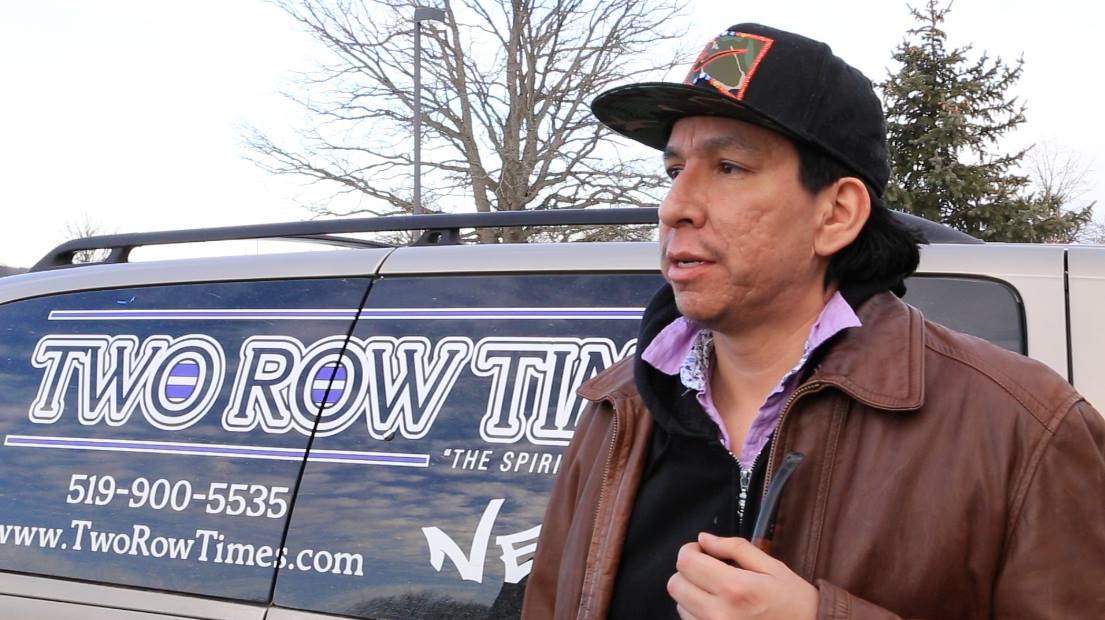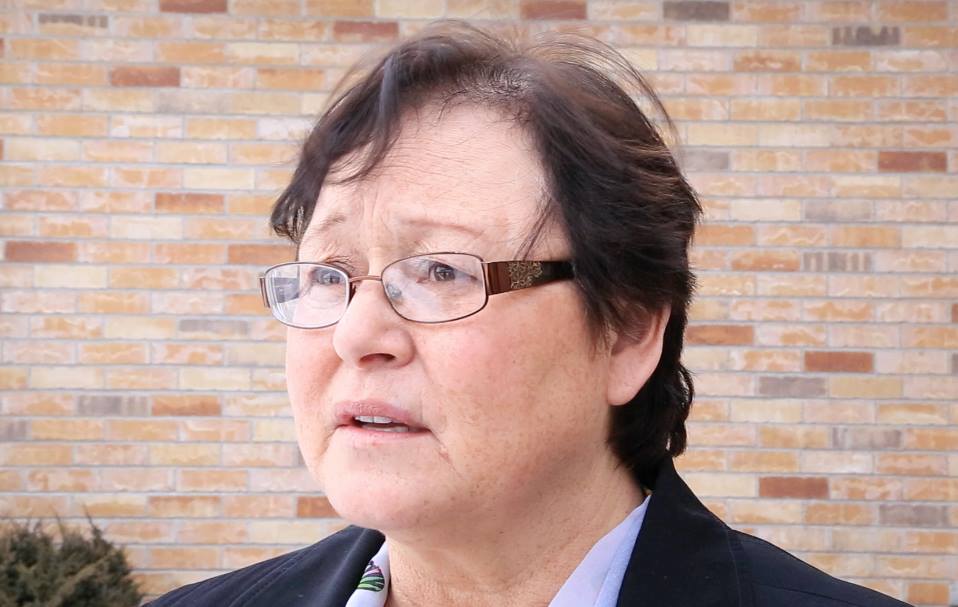Six Nations meeting rallies community against Bill C-10
by Noaman G. Ali
Six Nations of the Grand River | “The introduction of Omnibus Bill C-10 is an attempt to criminalize the hard-working families and entrepreneurs of Six Nations and other territories,” Jonathan Garlow said to over two hundred people gathered at the Polytechnic of the Six Nations of the Grand River on February 22.
“It will disrupt the reconciliation efforts by Canada to restore the relationship of peace and respect with Indigenous nations, possibly resulting in another confrontation.”
The meeting was organized by the Two Row Times newspaper. Garlow, founder of the Two Row Times and owner of a small printing shop in Six Nations, told BASICS the community meeting was held to inform the many families in Six Nations who are involved in and benefit from the tobacco trade about the upcoming Bill and to start a conversation about resisting it.
The law not only criminalizes unstamped tobacco, it also introduces mandatory minimum sentencing that could land ‘offenders’ in prison for at least two years.
The Bill “seems to be a direct attack on the economic sovereignty of the Haudenosaunee [“Iroquois” or Six Nations] people in particular and Native people more generally,” Toronto lawyer Mike Leitold, who also addressed the meeting, told BASICS. “The Native tobacco trade is generally not sanctioned by the federal and provincial authorities and would be considered contraband.”
For hundreds of Indigenous people, the tobacco industry has meant an escape from poverty. Six Nations entrepreneur Audrey Hill told BASICS that her small tobacco manufacturing business directly employs 30 people, but benefits many more. “If they have five or six people at home, we’re talking 150-200 people, and anyone they help out—like their grandparents.”
When addressing the meeting, Hill estimated there were 12 such small tobacco manufacturers in Six Nations, indirectly contributing to 3,500 people’s livelihoods.
“People can’t borrow money here,” Hill said to BASICS, as banks impose restraints on the lending power of Indigenous people, and so suppress Indigenous business. Tobacco manufacturing and trade is one of the few businesses that can stabilize. They supply restaurants, pharmacies, convenience stores. “It’s not about personal wealth, it’s about making sure your community and families have some stability.”
In Tyendinaga, proceeds from the tobacco trade have been reinvested into food security and health awareness programs, according to speaker Shawn Brant, who owns a small “smoke shop” that sells Native tobacco. These social programs are not welfare, they are community building projects based on Indigenous economic self-determination. Natives want to move forward and enjoy the “same benefits that our non-Native sisters and brothers enjoy,” Brant said.
All speakers agreed that the legislation, by trying to destroy this small but vibrant industry, sought to undermine sovereignty and reintroduce dependence on the Canadian government.
Stephen John Ford, a lawyer also from Tyendinaga, told the meeting that outside of tobacco, the only viable industry on virtually all reserves is the Band Council administration, whose funding comes directly from the Canadian government, making them entirely dependent on the Canadian state and its colonial structures.
“With all due respect to the Band Councils, they are arms of the Canadian government,” Joe Deom, an education advocate and engineer from Kahnawake, told the gathering.
Large tobacco corporations and non-Indigenous convenience store owners have also come together to try and malign Native tobacco with baseless propaganda, according to journalist and Indigenous womens’ rights advocate Audrey Huntley. “There seems to be no real basis [to allegations] that there are worse health effects or effects on children smoking” of Native tobacco, lawyer Leitold said to BASICS.
Indeed, it seems the Canadian state, “Big Tobacco” and other non-Native businesses are forming an unholy alliance to put a brake on Indigenous people actually developing a profitable and competitive industry over which the Canadian government will have little or no control.
“It’s about denying First Nations peoples their own industries, their own sources of income,” Ford said. “It’s about federal control of First Nations people. They don’t want you to make money. It’s continued colonial oppression. This is a microcosm of that broader picture.”
Ford suggested that First Nations administrations should pass their own tobacco taxation laws and express their own jurisdiction. “That’s the fight we want.” These laws would be challenged by the Canadian governments in courts, and the burden would be on the Canadian government to prove that they have sovereignty over Indigenous nations. “Which they don’t,” Ford said to applause.
Brant disagreed about appealing to the courts, and put the looming crackdown on the Native tobacco trade in terms of a war on Indigenous people. He was skeptical about reasoning with “a government that calls itself a law and order government, but denies justice to the families and the women—825 times in the past few years—and yet will seek to prosecute and to impose mandatory minimums on men who only seek to support our communities and our nations and our families.”
Brant recently made headlines for offering an ultimatum to the Canadian government to call an inquiry on the issue of missing and murdered Indigenous women or to face an economic blockade. He stressed that the issue was the most basic one, and yet was part of a broader set of attacks on Indigenous people
“We will take this government on, on this issue of missing and murdered women, with the understanding that First Nations’ education, that healthcare, land and resource extraction issues, everything else is being dealt with at the same time as we engage them on an issue that is the most righteous and just that we can bring forward.
“I don’t want there to be any misunderstanding that we are fighting for economic gain and using our sisters as cannon fodder for that battle…. We took a position on murdered and missing women because we feel that if the government is engaging us in a conflict, in a confrontation, in a war over our existence, then we don’t have to decide what legal argument we have to take them to court on, we only need to decide whether or not we’re going to stand up, walk on to that battlefield, and meet them, engage them, fight them and defeat them.”
“That’s what we have to decide,” Brant said to great applause. He added, “If they’re going to come in and target our economy, then we better be damn well prepared to stand up and target theirs as well.”
Ford later responded that the struggle for self-determination should be waged on many fronts, for the attack on tobacco is part of a long unfolding and concerted attack on the lives, livelihoods and ways of life of Indigenous people.
“We’re asserting our sovereignty by saying that we can produce goods and services from our own community,” Garlow said to BASICS. “We won’t be dictated to by foreign governments telling us what we can and cannot sell.”
Ultimately, it’s not about the tobacco as a thing but as a means of empowerment used by the people—“It’s not ever a thing , it has to be the people. The people are the power, the people are the source,” Hill told BASICS. “You take things from the people, they will want to say, ‘Why? Why? No, you can’t, because it’s not yours to take.’ And that’s what’s going on here.”
With files from Shafiqullah Aziz.
Comments



Pingback: Bill C-10 An Act to amend the Criminal Code | the anti-colonial committee
Hello and thank you for this article, I am a Tobacco Store Owner and have a import and export license sell Tobacco and Tobacco related province from the Federal Indian Affairs Minister in 2011 and I have been in business since 2010 under BCR, Federal Band Council Resolution. I have tried to make myself known with Grand River Tobacco but have been refused any real call backs a few years ago to get a good price. So I went to a friend from there and got local prices and at time was still good from prices in Alberta. Mind you I was not importing truck load but small load under 2000. Yes we are discriminated at home with our Banking Institutions and yes our Band Council often our main employers and often any form of independent economy doesn’t work as well as Government Businesses or services. What I do content with is that as a First Nations Band Member owned Independent Business we assert our Rights under our Sacred Treaty which gives us the Power to Coordinate our own Economies free of prosecution. We assert our Governing Structure were absolute in the time of signing our sacred treaties and we assert our jurisdiction is held with Treaty 6 region and within Canada. It is our belief if we wanted to do business in another First Nations area we are obligated to ask leadership to begin creating Trade and Commerce. We will stand our ground on the issue of our ability to carry out business according to our ancestral rights given to us as First Nation and those reflecting Treaty Obligations. We are still wanting to create Trade with our Brothers to the East.